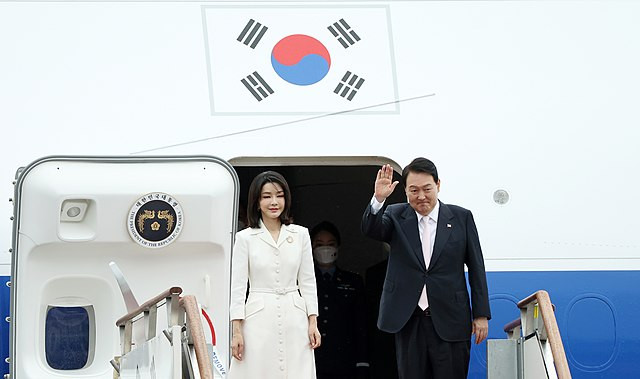South Korea's political scene has intensified following the government's tacit approval of Japan's decision to release treated radioactive water into the sea, aligning itself closer to the U.S.
Lee Jae-myung, the leader of the largest opposition party, the Democratic Party, began a hunger strike on August 31 to protest President Yoon Suk Yeol. One of Lee's grievances was Yoon's administration's lack of opposition to Japan's decision.
By Monday, after 19 days of fasting, Lee's health deteriorated, leading to his emergency hospitalization. Despite medical treatment, Lee remained steadfast in his hunger strike.
Lee's actions not only targeted Yoon's government but also aimed to deflect from corruption investigations against him. Lee is under investigation by the Seoul Central District Prosecutor's Office for three cases of corruption and perjury. Hours after Lee was hospitalized, prosecutors sought a court warrant for his arrest.
While preparing for the United Nations General Assembly in the U.S., President Yoon approved the arrest request for Lee on the 19th. In response, the Democratic Party declared a "full-scale resistance" against Yoon's administration, demanding the resignation of Prime Minister Han Deok-soo and the entire cabinet.
Will Lee be Arrested?
Under South Korean law, sitting members of the National Assembly have immunity from arrest during their term, a provision designed to protect lawmakers from political persecution. Thus, even with Yoon's approval, it doesn't guarantee Lee's arrest.
For authorities to arrest Lee, they need the National Assembly's approval. Reports suggest that the Ministry of Justice will submit the arrest request to a full session of the National Assembly on Wednesday, with a vote expected on Thursday.
The National Assembly operates under a unicameral system. Of its 300 seats, Yoon's ruling party, the People Power Party, holds 114, making it a minority. The Democratic Party, led by Lee, holds 167 seats.
For the arrest request to be effective, a majority of the National Assembly members must approve it. Given the Democratic Party's majority, if all its members vote against it, the request will be nullified.
Although Yoon's administration opposes Lee's hunger strike, the arrest request doesn't pertain to the strike. Currently, Lee is under investigation for various charges, including corruption related to real estate development, alleged solicitation of false testimony, and a case involving remittances to North Korea.
Political Struggle Intensifies
With National Assembly elections set for next April, the Democratic Party, led by Lee, slightly leads in polls over Yoon's conservative People Power Party. If the Democratic Party gains more seats, Yoon's governance will face challenges.
The two parties have always been fierce rivals. The People Power Party, a merger of several parties, including the one of former President Park Geun-hye, contrasts sharply with the Democratic Party, which was affiliated with former President Moon Jae-in.
Even without major incidents, the rivalry between the two parties never ceased. The release of radioactive water by Japan, Yoon's declining approval ratings, and the upcoming elections have heightened tensions.
Lee's hunger strike, which began a week after Japan started releasing the treated water and just before he was again questioned over corruption, has been a focal point. Lee has accused Yoon's administration of undermining democracy, destroying the middle class, and failing to oppose Japan's actions.
Lee's demands for Yoon include an apology to the nation for undermining democracy, a complete cabinet reshuffle, opposition to Japan's water release, and suing the Japanese government under international maritime law.
While hunger strikes as a form of political protest are not uncommon in South Korea, most have not prevented government actions, but some have boosted the protester's popularity.
A poll released by Realmeter on Monday showed Yoon's approval rating dropping to 35.5%, while the Democratic Party's support rose to 46%. As both parties gear up for next year's elections, the People Power Party has started targeting officials from Moon's tenure.
On Friday, the Board of Audit and Inspection requested investigations into 22 former officials, including those from Moon's office and former ministers. The board accused them of pressuring statistical departments to manipulate key economic data.
The Democratic Party, on Monday, submitted a motion in the National Assembly demanding the resignation of Prime Minister Han Deok-soo and the entire cabinet. They also announced a "full-scale resistance" against what they termed Yoon's "tyrannical government."
Former President Moon Jae-in, now retired, has also started making public appearances. On Tuesday, he attended an event in Seoul commemorating the fifth anniversary of the "9·19 Pyongyang Joint Declaration." After the event, Moon visited Lee in the hospital.





